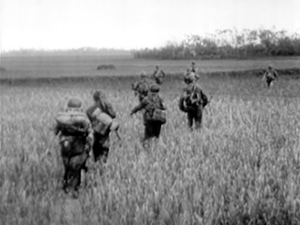Operation Atlante
Operation Atlante was a military operation of the First Indochina War which consisted of three stages, Aréthuse, Axelle and Attila, taking place across six months from January 20, 1954. French Army commander General Henri Navarre employed 53 battalions of French infantry and artillery in an attempt to ensnare 30,000 Việt Minh troops thought to be secreted among the 2,000,000 strong local population in the marshy lagoons between Da Nang and Nha Trang in southern Vietnam.[2] The objective was to pacify the local populace and re-establish the sovereignty of the Bảo Đại government.[1][2]
| Operation Atlante | |||||||
|---|---|---|---|---|---|---|---|
| Part of the First Indochina War | |||||||
 French troops sweep paddy fields. | |||||||
| |||||||
| Belligerents | |||||||
|
| |||||||
| Commanders and leaders | |||||||
| Henri Navarre | Võ Nguyên Giáp | ||||||
| Strength | |||||||
| ~25,000[1] | ~30,000 | ||||||
Through initial deployment across four weeks of amphibious landings on the coastline in Aréthuse between January 20 and 29,[3] the French forces were continually reinforced through eight weeks of Axelle. Attila, envisaged as a two-month stage where the full French force closed out the Việt Minh, was made infeasible come March as French casualties mounted. Snipers and mines whittled the French force down, while Việt Minh attacks in the highlands diverted French attention. The French faced a series of sacrificed rearguard actions for each village while the main Việt Minh forces remained elusive. Võ Nguyên Giáp's troops gathered momentum and began to strike back, and together with the conduct of the Vietnamese National Army this forced the French to abandon Atlante. Navarre would later declare Aréthuse and Axelle as successful, while Attilla remained unrealised.[2]
Atlante led to much consideration among the French command. The conduct of the ANV prompted French Chief of Defence Staff Paul Ely to comment that "It is now clear that, however sceptical I was when Monsieur Pleven asked my opinion on the possibility of the Vietnamese reliving us in the short term, I was still too optimistic. They are incapable of doing anything serious for several years." It had been the ANV's first major test in military operations. Chief of the Air Staff General Fay wrote that "It would have brought better results if we had consistently concentrated the maximum of bombs on one or two points and ensured the almost permanent cutting of the route at these points by harassing the repair work." Navarre received criticism for focusing on Atlante while operations were taking place at Dien Bien Phu, however historian Martin Windrow argues this to be unjustified given the contrasting nature of the two events.[2]
Notes
- Colonel Grintchenko (May 2007). "Operation Atlante (January-July 1954) The Last Pacification Operation in Indochina" (PDF). Centre de Doctrine d'Emploi des Forces. Retrieved 4 January 2010.
- Windrow, p. 278-282.
- Windrow, p. 195.
References
Online
- Fall, Bernard B. (December 1956). "Indochina: The Last Year of the War. The Navarre Plan" (PDF). The Military Review. Archived from the original (PDF) on 2009-07-31. Retrieved 2009-07-23.
- Colonel Grintchenko (May 2007). "Operation Atlante (January-July 1954) The Last Pacification Operation in Indochina" (PDF). Centre de Doctrine d'Emploi des Forces.
Printed
- Fall, Bernard B. (1966). Hell in a Very Small Place. The Siege of Dien Bien Phu. London: Da Capo Press. ISBN 978-0-306-81157-9.
- Fall, Bernard B. (1961). Street Without Joy. The French Debacle in Indochina. New York: Stackpole Military History. ISBN 978-0-8117-3236-9.
- Fall, Bernard B. (1967). The Two Vietnams. A Political and Military Analysis (Second ed.). New York: Frederick A. Praeger, Inc.
- Roy, Jules (1963). The Battle of Dien Bien Phu. New York: Carroll and Graf Publishers. ISBN 978-0-7867-0958-8.
- Windrow, Martin (2004). The Last Valley. Dien Bien Phu and the French Defeat in Vietnam. London: Weidenfeld and Nicolson. ISBN 978-0-304-36692-7.